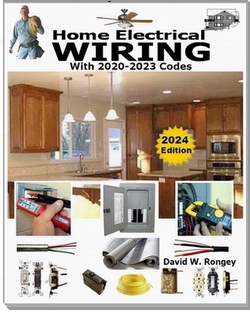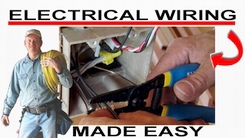» Need Electrical Help? Ask the Electrician
New Range Electrical Outlet

|
By Dave Rongey
© By: Dave Rongey |
Circuit Requirements for a New Electric Range Outlet
Electrical Outlets Question:
Electrical outlet for new range 220 line
I am renovating an old house, including a complete kitchen remodel. I removed the old electric-only wall oven, which was wired directly (no outlet) to a 220 line coming up through the floor underneath it.I need to move the line over a few feet to where the new gas/electric range will be.
The installation manual for the new range says the following:
We recommend that the range be installed with a power cord set (not supplied). The electrical rating of the power cord set must be 120/240 volt, 30 amperes minimum.
Range Power Cord
The power cord set shall be marked for Use with Ranges.
Always use a new power cord. Ranges are dual rated for use on either 120/240 VAC or 120/208 VAC. Most wiring codes require a separate circuit with separate disconnect switch and fuses either in the main entrance panel or in a separate switch and fuse box.
The range requires a minimum of a three wire 120/240 or 120/208 volt, 30 AMP, 60 Hz AC circuit.
I know I'll need to install an outlet, which I'm presuming will need to be a 220 outlet (since it's a 220 line). So my naive question is this- what is the difference between \ 220\ and \ 240 VAC\ ? Same thing for \ 110\ vs \ 120 VAC\ ?
I'm thinking these are one and the same in what they reference?
Given that the manual says for use on either 120/240 VAC or 120/208 VAC, I should be able to use my existing 220 line, since I have confirmed it is on its own circuit, right?
Thanks in advance for any advice,
Tim
Hi Tim - Great Electrical Repair Question!
Yes you are right, 110/120 and 220/240 volt are meaning the same things. There are countries where the voltage is more specific, and we do have some commercial services which will actually produce 208 volts, but that is getting into areas outside of the home.
Range Circuit
Yes, you can use your existing range circuit as long as the extended wiring is placed in an accessible junction box, and if you extend the circuit with anything other than the original wire gauge then you will need to replace the circuit breaker to protect the smallest gauge wire on the circuit.
I strongly advise extending with the original wire gauge because it maintains the integrity of the circuit.













